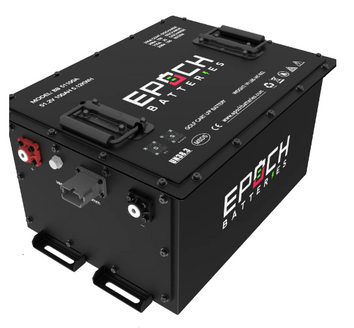Common Myths About Lithium Batteries in Golf Carts: Debunked
As a golf cart owner, you’ve probably heard a lot of chatter about lithium batteries. These power sources have been making waves in the golf cart community, but with new technology comes misconceptions. Let’s set the record straight and explore why lithium batteries might be the game-changer you’ve been looking for on the green.
Golf carts have come a long way from their humble beginnings, and so have their power sources. Lithium batteries are the latest innovation in golf cart technology, offering a host of benefits that are revolutionizing the way we think about cart performance and maintenance. But as with any new technology, myths and misconceptions abound. It’s time to separate fact from fiction and give you the lowdown on what lithium batteries really bring to the table for your trusty golf cart.
Myth 1: Lithium Batteries Are Too Expensive
You might have heard that lithium batteries will break the bank, but let’s look at the bigger picture. Sure, the initial cost is higher than traditional lead-acid batteries, but that’s not the whole story.
When you factor in the longevity and performance benefits, lithium batteries often come out on top in terms of value. These powerhouses can last up to 5,000 charge cycles, compared to the 500-1,000 cycles you’ll get from lead-acid batteries. That means you could be replacing your lead-acid batteries 5-10 times before a lithium battery calls it quits!
Plus, lithium batteries are maintenance-free. No more topping up water levels or dealing with corrosion. And let’s not forget the improved performance – faster acceleration, consistent power output, and longer range per charge. When you add up these benefits, the initial investment starts to look pretty smart for your wallet in the long run.
Myth 2: Lithium Batteries Are Unsafe and Prone to Fire
Safety is a top priority for any golfer, and you might have concerns about lithium battery safety. Rest assured, modern lithium batteries for golf carts are designed with multiple safety features to prevent overheating and fire risks.
These batteries come equipped with built-in battery management systems (BMS) that monitor temperature, voltage, and current. If anything goes awry, the BMS shuts down the battery to prevent damage or safety hazards. In fact, lithium batteries are often safer than lead-acid batteries, which can release harmful gases and corrosive materials if damaged.
Also, a lot of the fire stories you may have heard are from lithium-ion (laptops, scooters, etc). Golf cart lithium is now Lithium-ion Phosphate (LiFePO4), which is MUCH safer.
Of course, proper usage and maintenance are key to any battery’s safety. Always follow manufacturer guidelines, and you’ll be cruising the course worry-free.
Myth 3: Lithium Batteries Don’t Perform Well in Extreme Temperatures
Weather shouldn’t dictate your golfing schedule, and with lithium batteries, it doesn’t have to. These power sources are surprisingly adaptable to various temperature conditions.
In cold weather, lithium batteries outperform lead-acid batteries hands down. While lead-acid batteries can lose up to 50% of their capacity in freezing temperatures, lithium batteries maintain most of their power. You’ll still get reliable performance for those chilly morning tee times.
Hot weather? No sweat for lithium batteries. They’re designed to operate efficiently in high temperatures, often up to 120°F (49°C). Just remember, extreme heat can affect any battery, so it’s best to park your cart in the shade when possible.
Myth 4: Lithium Batteries Have a Shorter Lifespan
If you’re worried about frequently replacing your golf cart’s battery, lithium technology will put your mind at ease. Lithium batteries boast an impressive lifespan that often surpasses their lead-acid counterparts.
While lead-acid batteries typically last 3-5 years with proper care, lithium batteries can keep your cart running for 8-10 years or more. That’s because they can handle many more charge cycles without significant degradation in performance.
Factors like usage patterns, charging habits, and environmental conditions can affect battery life. But with lithium batteries, you’re starting with a considerable advantage. Plus, their low maintenance requirements mean less chance of user error impacting longevity.
Myth 5: Lithium Batteries Are Not Environmentally Friendly
For the eco-conscious golfer, lithium batteries are actually a greener choice. While it’s true that the mining of lithium has environmental impacts, the overall lifecycle of these batteries is more environmentally friendly than lead-acid alternatives.
Lithium batteries are highly recyclable, with up to 95% of their components being reusable. They also don’t contain toxic materials like lead, making them safer for the environment. Their energy efficiency is another green bonus – lithium batteries convert more of their stored energy into usable power, reducing waste.
When you consider their longer lifespan and higher efficiency, lithium batteries contribute to less waste and lower energy consumption over time. That’s a win for your golf game and Mother Nature.
Conclusion
We’ve debunked some of the most common myths about lithium batteries in golf carts, and the truth is clear: these power sources offer significant advantages for the modern golfer. From cost-effectiveness and safety to performance and environmental benefits, lithium batteries are changing the game.
As technology continues to advance, we can expect even more improvements in lithium battery technology for golf carts. The future looks bright (and efficiently powered) for golf cart enthusiasts everywhere.
So, next time you’re considering an upgrade for your trusty cart, don’t let misconceptions steer you wrong. Lithium batteries might just be the power play your golf game needs. Happy golfing, and may your drives be long and your batteries longer-lasting!

















